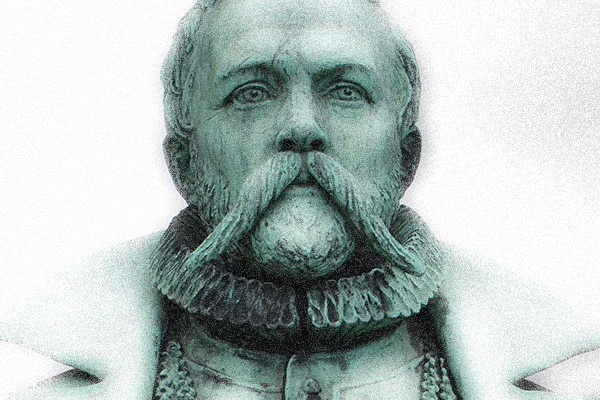Fiction
Useless, Even Harmful

By Donald Geary
 hick gray clouds obscure the skies above Hven, irritating the master of the house. The previous night was lost, too. God covering His mistakes? Too late, Tycho thinks, the music of the spheres is dead. He crosses the gravel courtyard, stones shifting beneath his boots, raised collar encircling his head. Behind him stands a castle, symmetrical and compact. He stood over the architects as they sketched, stroked his mustache, coughed at wayward lines. The resulting structure’s gothic domes weep now in the mist. The gray sea becomes the gauze of sky becomes an atmospheric ceiling so low the short spires threaten it. There is no horizon. There is nothing to see. Phantoms of mist swirl through the courtyard and vanish. And was I describing myself? What to make of these pages at the bottom of a drawer?
hick gray clouds obscure the skies above Hven, irritating the master of the house. The previous night was lost, too. God covering His mistakes? Too late, Tycho thinks, the music of the spheres is dead. He crosses the gravel courtyard, stones shifting beneath his boots, raised collar encircling his head. Behind him stands a castle, symmetrical and compact. He stood over the architects as they sketched, stroked his mustache, coughed at wayward lines. The resulting structure’s gothic domes weep now in the mist. The gray sea becomes the gauze of sky becomes an atmospheric ceiling so low the short spires threaten it. There is no horizon. There is nothing to see. Phantoms of mist swirl through the courtyard and vanish. And was I describing myself? What to make of these pages at the bottom of a drawer? He opens a carved door and disappears within. Young Blaeu crosses the main hall, headed toward the basement stairs. Candles light the castle, cast dancing shadows of Blaeu’s unkempt hair upon the far wall. Blaeu asks a question about connections between the stars and the weather, the pleasantry of an apprentice asking after his mentor’s interest. Tycho growls a response without even looking at him, and the young man proceeds to the basement. Odd moment, uncertain effect.
Daytime Tycho is a picture of discomfort. He is exhausted and needs rest. He cannot be still and must work. This stalwart fortress, this ragged island, this house of majesty, this seat of vision, this Uraniborg, is nothing to him but a series of waiting rooms. Its colorful murals, its labs and workers, his wife and children: daytime distractions. He walks away while they are speaking, fails to feign interest. He watches the weather, knows the minute the sun will set, the moment first stars will appear. Any cloud becomes a blind spot, a source of anger and despair. He exists to refine sight and perfect vision, to calculate, note, and record. He discovered the books were wrong and has dedicated his life to correction. (I dreamed him and forgot the dream.) He wanders the castle, each room an expression of his mind’s fancies. A printing press issues his tables and tracts. A quadrant gleams against the wall of an upstairs chamber. He has indoor plumbing, fountains and towers, cupolas and cornices. Astronomy’s center is not the Earth, not the sun, but Uraniborg, the source of new knowledge, of new accuracy composing new truth. Tycho writes them every night. All these claims revealing. Images and words in the bottom of a drawer. How many years. A shocking number. He descends to the basement, avoiding the instrument makers. Impossible in his demands for accuracy, he knows a step into the lab is a step into endless examination and discussion. He won’t look over their shoulders today, won’t triple-check their measurements. He heads instead to the printing room and lights a lamp within. Shelves of manuscripts appear in its buttery glow. His work, thoughts, and experiences are translated here in meticulous letters and figures. He pulls a manuscript from the shelf, opens to a page, and begins to read. His breathing slows. He is calmed, reassured. The thick paper, the binding glue, his observations and geometries: the accrued knowledge of his vigils, testimony of his witness. I built a mirror here, to look into and claim I was a man. Easy hunt. Feeble prey.
Tycho nods forward, head on hands, and dreams: a crown, a king, royal costume as currency’s marginalia. The dream shifts, though, to one of recognition: he explains the universe he writes by the light of stars, opens the roof’s petals to reveal his spinning planets, the twisting galaxies. The king is in awe. Tycho stirs, awakens, feels he has forgotten something. He cranks the worn press, testing the mechanics. He wanders to the lab to check on the craftsmen. I was at a desk or old table. Inventing a self with a self’s qualities. Discipline and talent, patience and insight. Placed self gently in the drawer. The craftsmen nod and smile, assuring Tycho everything is being built according to his standards, and he leaves as abruptly as he arrived. His dread of these hours, the interminable afternoon. Other men anticipate dinner with family and friends, celebration of a day’s work. Tycho’s food is fuel for a sleepless night. He climbs the stairs to the front hall and opens the door. The mist is in retreat, he spies swaths of ocean, patches of sky. He knows the island well, the waters that surround and the vapors that hover. Work will be done tonight: further correction, further truth. So much bravado here, everything an accomplishment. Odd young man. What was I conjuring? (Failing to conjure.) Tycho’s steps echo through the house, announcing his command and energy, his dedication and force. Carefully listed qualities, strangely conceived. The bottom of a drawer.
Night falls, and with it, peace. Wife and children slumber in the warmth of downy beds. The observatory’s ceiling unfolds to reveal the sparkling sky. Tycho directs his staff quietly. (I composed quietly.) Measurements are taken, calculations logged. There is an efficiency in the way he leads the men, a certainty of purpose. (I with no men, uncertain purpose.) Blaeu stirs his tea. His spoon rings quietly against the cup. The metal instruments are cold to the touch. The men exhale vapor. What here did I imagine? Who did I plan to be? In the peace and certainty of their work, truth evades them. Among multiple instruments designed for vision, no one sees the figure on the waves. A dark figure, rowing toward the lights, to bring news of death: of the king and their future. Uraniborg sinks in the ocean of time. I wrote the boatman, wrote the news. Last attempt, conjuring little. Put it in a drawer, disappeared in time. (“The ocean of time.”) Tycho labors unaware, gathering his stars. The boatman arrives. Truth escapes. Strange self. Strangely right. Nicely done. Back into the drawer.
 Donald Geary last published short fiction in the 1990’s.
Donald Geary last published short fiction in the 1990’s.




